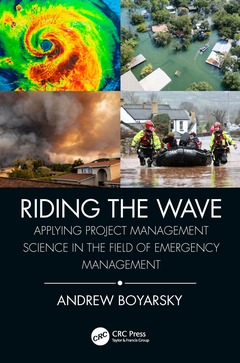Riding the Wave Applying Project Management Science in the Field of Emergency Management Security, Audit and Leadership Series
Auteur : Boyarsky Andrew

Emergency managers and public safety professionals are more frequently being called on to address increasingly challenging and complex critical incidents, with a wider variety and intensity of hazards, threats, and community vulnerabilities. Much of the work that falls into the scope of emergency managers ? prevention, preparedness, mitigation ? is ?blue sky planning? and can be contained and effectively managed within projects. This book provides a foundational project management methodology relevant to emergency management practice, and explains and demonstrates how project management can be applied in the context of emergency and public safety organizations.
Special features include:
- an initial focus on risk assessment and identification of mitigation and response planning measures;
- a clear set of better practices, using a diverse set of examples relevant to today?s emergency environment, from projects to develop emergency response exercises to application development to hazard mitigation;
- a framework for managing projects at a strategic level and how to incorporate this into an organization?s program, and presents how to develop and manage an emergency program and project portfolio; and
- suitability as both a hands-on training guide for emergency management programs and a textbook for academic emergency management programs.
This book is intended for emergency managers and public safety professionals who are responsible for developing emergency programs and plans, including training courses, job aids, computer applications and new technology, developing exercises, and for implementing these plans and components in response to an emergency event. This audience includes managers in emergency and first response functions such as fire protection, law enforcement and public safety, emergency medical services, public health and healthcare, sanitation, public works, business continuity managers, crisis managers, and all managers in emergency support functions as described by FEMA. This would include those who have responsibility for emergency management functions, even without the related title.
PART 1. Setting Up the Basecamp for Projects, 1. The Accidental Project Manager, 2. Why Project Management Is a Good Fit for Emergency Management, 3. Risk Management for Emergency Management and Public Safety, 4. Developing Strategies and Capabilities to Manage Major Risk Events, PART 2. Project Management Foundations and Planning for a Course of Action, 5. Developing the Project Scope, 6. Developing the Project Schedule, 7. Developing the Project Budget, 8. Developing the Human Resources Plan, 9. Developing the Quality Plan, 10. Developing the Risk Plan, 11. Developing the Stakeholder and Communications Plan, 12. Procurement, Contract Management, and Reporting, 13. Monitoring and Control: Tracking Project Progress, PART 3. Strategic Project Management, 14. Program Management and Project Portfolio Management, 15. Emergency Response as a Project, 16. Quality Management in Emergency Management Programs and Continuous Improvement for Responses, Projects, and Programs, 17. Project Leadership, 18. Next Steps
Andrew Boyarsky, MSM, PMP, CBCP, cABCF, is President of Pinnacle Performance Management, and an emergency management and disaster recovery specialist with 30 years of experience in project management and 23 years in emergency management, business continuity, and disaster recovery. He is a Clinical Associate Professor and teaches at NYU, John Jay College of Criminal Justice, and at Yeshiva University. In the early 1990s, he developed and managed large-scale emergency medical and mass care response projects overseas in former Yugoslavia and in the Caucasus with the International Federation of the Red Cross and Red Crescent Societies and Catholic Relief Services/Caritas Internationalis. From 2007-2016 Prof. Boyarsky was Project Manager for Coastal Storm Plan Training working on behalf of the NYC Office of Emergency Management, responsible for training over 30,000 City staff for emergency sheltering operations, and managed additional training programs in logistics, recovery, special medical needs, and disability, access, functional needs, and pandemic response.
His clients have included FEMA, the Regional Catastrophic Planning Team of NY-NJ-CT-PA, New York City Office of Emergency Management, New York City Health Department, Los Angeles Emergency Management Department, Baltimore City Health Department, Westchester County (NY) Office of Emergency Management, and NYC Human Resources Administration. He has developed emergency management programs and training curricula for mass care functions (evacuation and sheltering), logistics, post disaster recovery assistance, mass fatality incidents, pandemic response, and the use of social media for emergency management organizations. In addition, Prof. Boyarsky was involved in the deployment and management of large-scale emergency sheltering in New York City during Hurricanes Irene and Sandy and planning during the pandemic response.
He has been a speaker on E-learning and virtual world course development at
Date de parution : 04-2024
17.8x25.4 cm
Date de parution : 04-2024
17.8x25.4 cm
